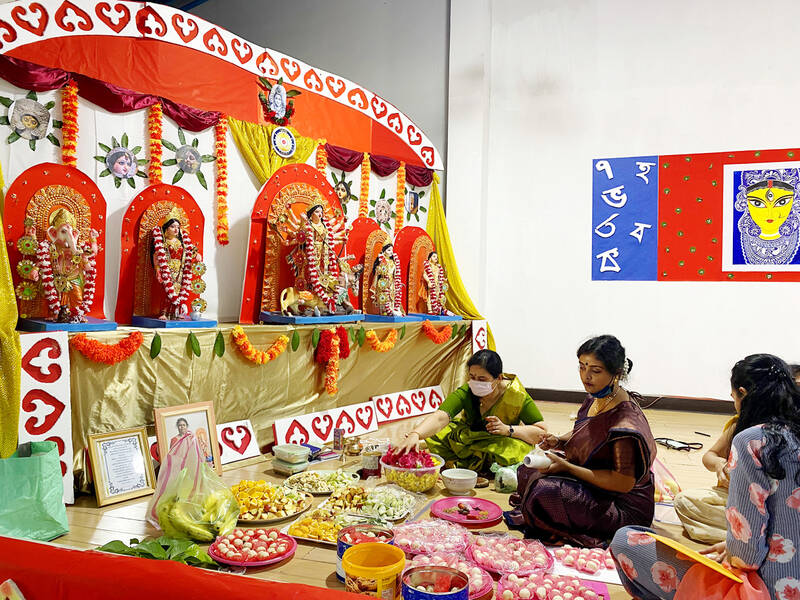The celebration of Durga Puja in the New Taipei City Library in Sijhih District (汐止) early this month shows once again the deepening cultural and educational ties between Taiwan and India.
Illustrating the deepening ties, Sujeet Kumar, an Indian member of parliament and Taiwan enthusiast, also attended the festival, which had extra significance due to it being recognized for its cultural value by the UN.
UNESCO this year inscribed Durga Puja on its Representative List of Intangible Cultural Heritage of Humanity and lauded the festival “as the best instance of public performance of religion and art... During the event, the divides of class, religion and ethnicity collapse as crowds of spectators walk around to admire the installations.”

Photo courtesy of Nandana Biswass
Durga is an important Hindu goddess and is worshiped as the symbol of the triumph of good over evil. The goddess, riding a tiger or lion, is associated with the protection of her children and fights demons and destructive forces.
The resolve and infinite energy of Durga is a persona that some in the Indian community feel President Tsai Ing-wen (蔡英文) embodies, as she remains calm in the face of the saber-rattling behemoth across the Taiwan Strait.
Although the festival is celebrated every year in October, primarily by the Bengali community, of late it has acquired a pan-India character and as such it is now celebrated in Indian communities across the globe.
The 10-day festival begins with Mahalaya, when the chanting of hymns consecrated to Durga permeates the ambiance in crescendo with the beating of the drums and the blowing of conks.
Due to Taiwan’s religious diversity and tolerance, the Indian community, estimated to be over 5,000, has started celebrating festivals like Durga Puja and Dewali (the festival of light) with gusto, receiving the wholehearted support and cooperation of locals and civic authorities in terms of finding proper venues.
It augurs well that, although India and Taiwan may not share formal diplomatic relations, the extent to which the two have moved closer culturally and educationally in recent years could not have been imagined decades earlier.
The relationship between civil society and coverage in the media both in India and Taiwan also raised awareness among the people and empathy for each other has grown phenomenally.
Rup Narayan Das is a Taiwan Fellow at National Chung-Hsing University and author of the book ‘Hong Kong Conundrum: Pangs of Transition.’

In the March 9 edition of the Taipei Times a piece by Ninon Godefroy ran with the headine “The quiet, gentle rhythm of Taiwan.” It started with the line “Taiwan is a small, humble place. There is no Eiffel Tower, no pyramids — no singular attraction that draws the world’s attention.” I laughed out loud at that. This was out of no disrespect for the author or the piece, which made some interesting analogies and good points about how both Din Tai Fung’s and Taiwan Semiconductor Manufacturing Co’s (TSMC, 台積電) meticulous attention to detail and quality are not quite up to

April 21 to April 27 Hsieh Er’s (謝娥) political fortunes were rising fast after she got out of jail and joined the Chinese Nationalist Party (KMT) in December 1945. Not only did she hold key positions in various committees, she was elected the only woman on the Taipei City Council and headed to Nanjing in 1946 as the sole Taiwanese female representative to the National Constituent Assembly. With the support of first lady Soong May-ling (宋美齡), she started the Taipei Women’s Association and Taiwan Provincial Women’s Association, where she

Chinese Nationalist Party (KMT) Chairman Eric Chu (朱立倫) hatched a bold plan to charge forward and seize the initiative when he held a protest in front of the Taipei City Prosecutors’ Office. Though risky, because illegal, its success would help tackle at least six problems facing both himself and the KMT. What he did not see coming was Taipei Mayor Chiang Wan-an (將萬安) tripping him up out of the gate. In spite of Chu being the most consequential and successful KMT chairman since the early 2010s — arguably saving the party from financial ruin and restoring its electoral viability —

It is one of the more remarkable facts of Taiwan history that it was never occupied or claimed by any of the numerous kingdoms of southern China — Han or otherwise — that lay just across the water from it. None of their brilliant ministers ever discovered that Taiwan was a “core interest” of the state whose annexation was “inevitable.” As Paul Kua notes in an excellent monograph laying out how the Portuguese gave Taiwan the name “Formosa,” the first Europeans to express an interest in occupying Taiwan were the Spanish. Tonio Andrade in his seminal work, How Taiwan Became Chinese,